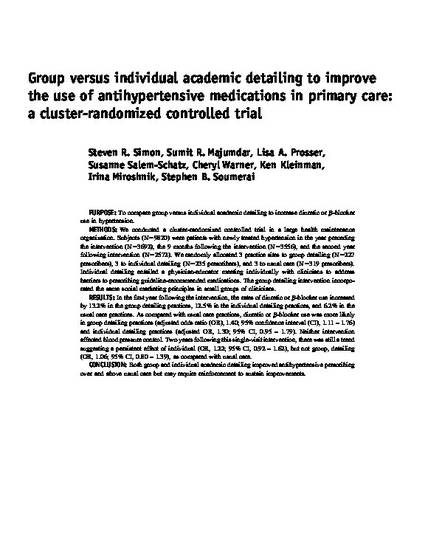
Purpose
To compare group versus individual academic detailing to increase diuretic or β-blocker use in hypertension. Methods
We conducted a cluster-randomized controlled trial in a large health maintenance organization. Subjects (N=9820) were patients with newly treated hypertension in the year preceding the intervention (N=3692), the 9 months following the intervention (N=3556), and the second year following intervention (N=2572). We randomly allocated 3 practice sites to group detailing (N=227 prescribers), 3 to individual detailing (N=235 prescribers), and 3 to usual care (N=319 prescribers). Individual detailing entailed a physician-educator meeting individually with clinicians to address barriers to prescribing guideline-recommended medications. The group detailing intervention incorporated the same social marketing principles in small groups of clinicians. Results
In the first year following the intervention, the rates of diuretic or β-blocker use increased by 13.2% in the group detailing practices, 12.5% in the individual detailing practices, and 6.2% in the usual care practices. As compared with usual care practices, diuretic or β-blocker use was more likely in group detailing practices (adjusted odds ratio (OR), 1.40; 95% confidence interval (CI), 1.11 – 1.76) and individual detailing practices (adjusted OR, 1.30; 95% CI, 0.95 – 1.79). Neither intervention affected blood pressure control. Two years following this single-visit intervention, there was still a trend suggesting a persistent effect of individual (OR, 1.22; 95% CI, 0.92 – 1.62), but not group, detailing (OR, 1.06; 95% CI, 0.80 – 1.39), as compared with usual care. Conclusion
Both group and individual academic detailing improved antihypertensive prescribing over and above usual care but may require reinforcement to sustain improvements.
Available at: http://works.bepress.com/kenneth-kleinman/19/
